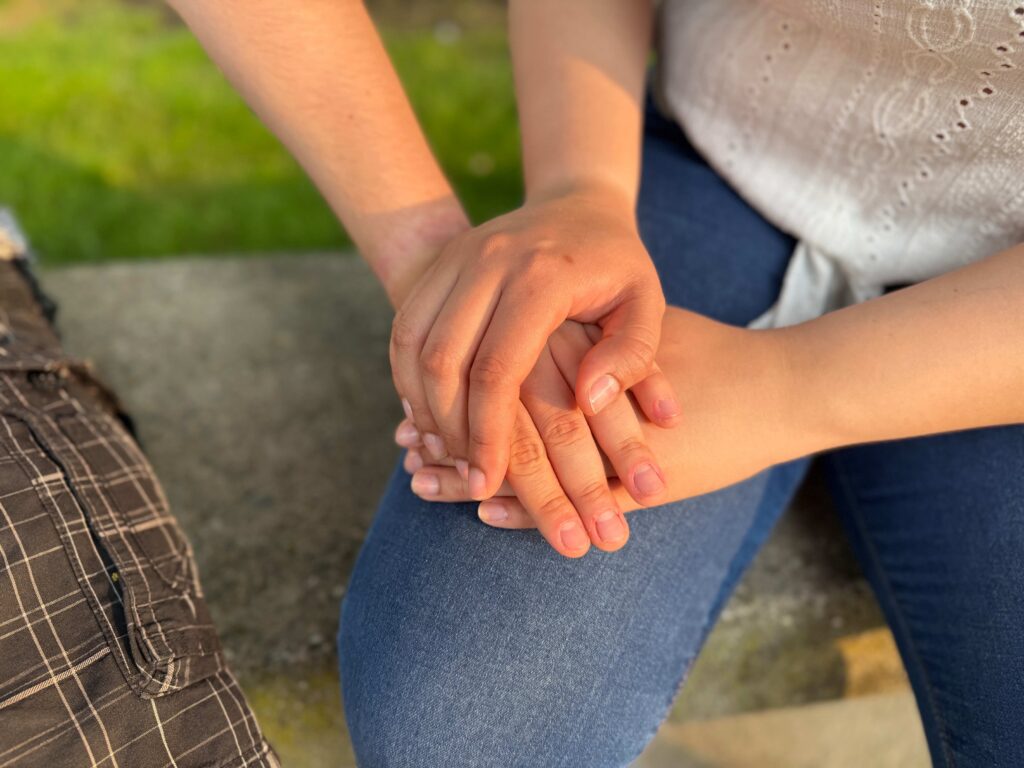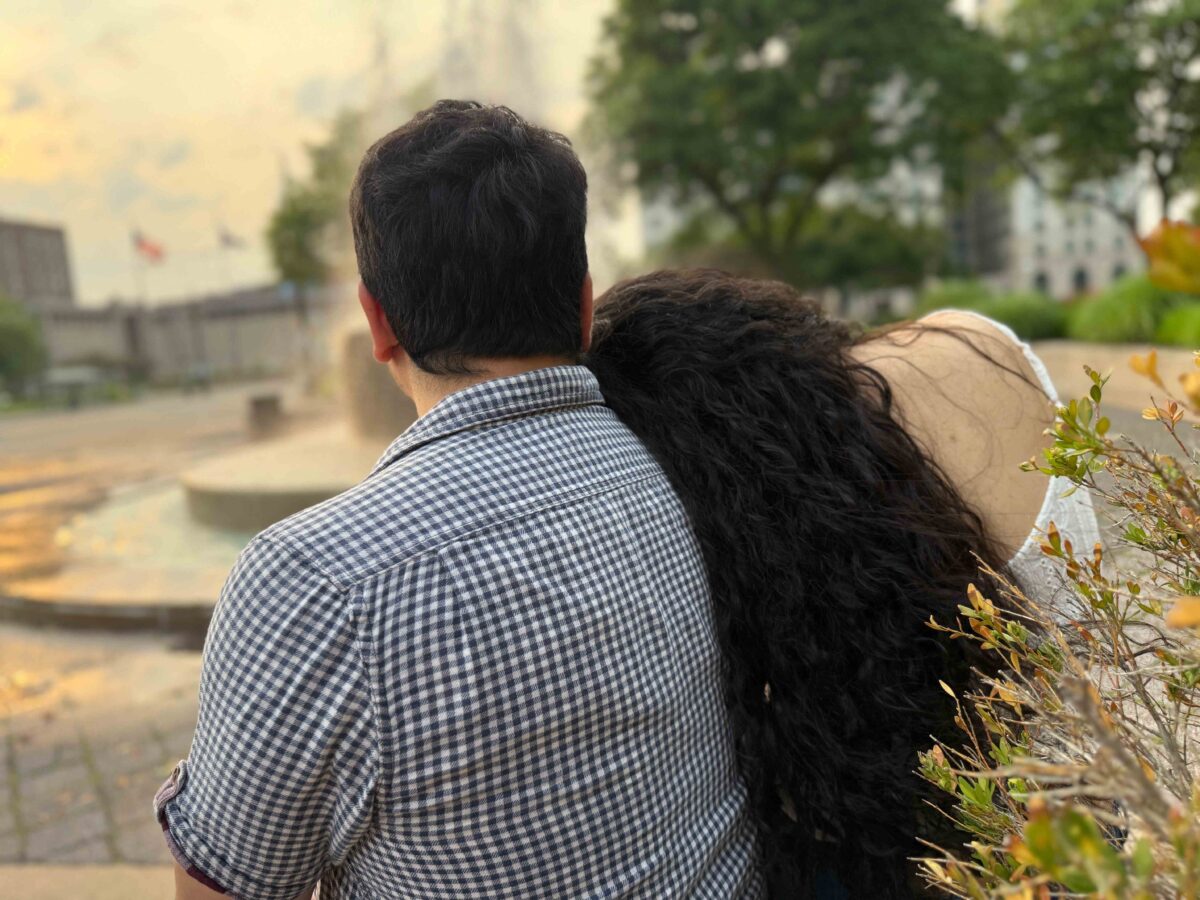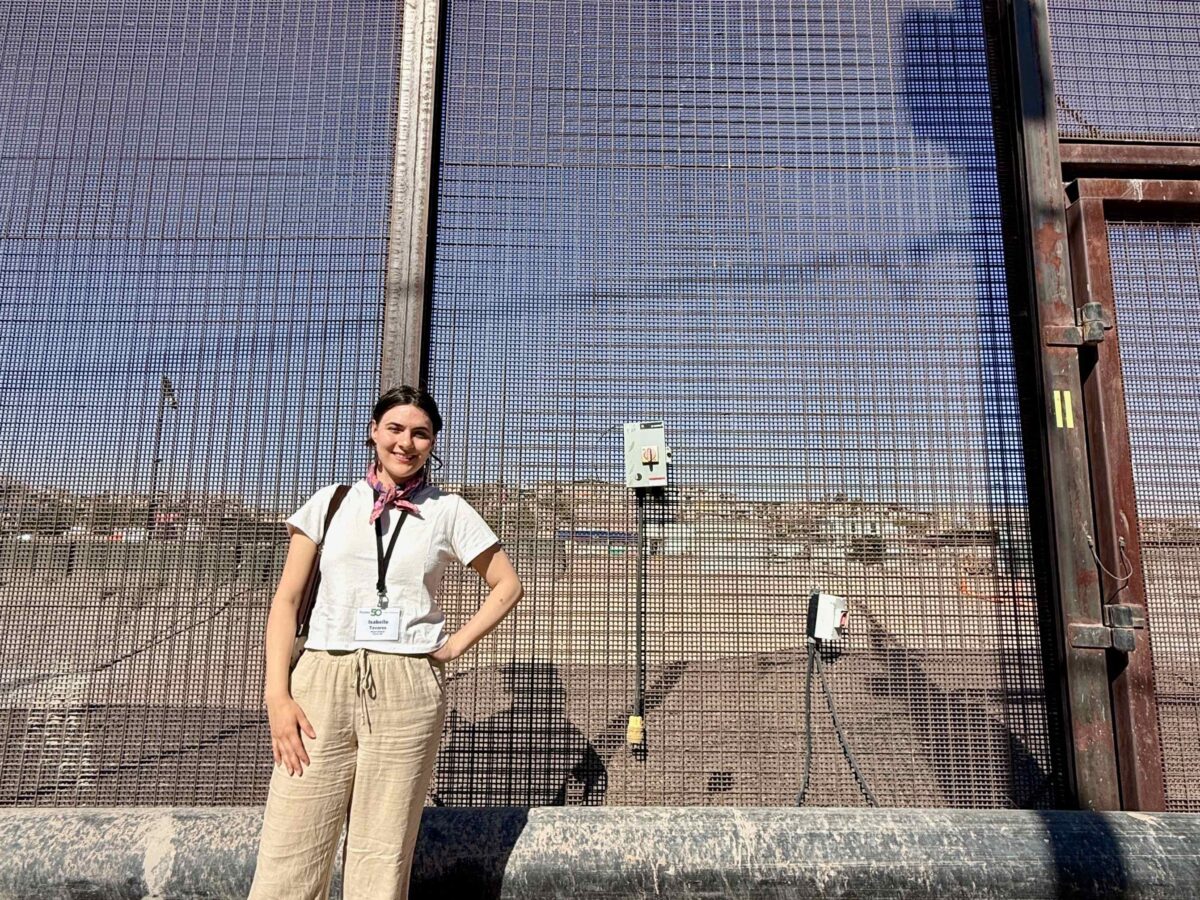Overview:
-A Venezuelan couple in Michigan describes the impact immigration uncertainty has on their mental health.
-Health care workers say the pressure on immigrants is not only an immediate threat to their well-being, but sets the stage for generational harm.
-Some people are missing prenatal appointments due to fear of law enforcement, University of Michigan School of Public Health researcher tells Planet Detroit.
Mar, a 28-year-old from Venezuela, had a full life in her home country. She earned her degree in social communication and worked as a professional ballet dancer and actress. The living conditions were challenging, and she became one of the 58,000-plus Venezuelans who were approved entry into the U.S. in 2023.
Mar, who asked to shorten her name due to fear of jeopardizing her situation, came to Detroit “legally through the airport and everything,” she said. She came via humanitarian parole, a discretionary authority by the secretary of Homeland Security that allows noncitizens to enter the U.S. temporarily for urgent humanitarian reasons or significant public benefit.
In October 2022, the Biden administration announced the parole program for Venezuelans, and in January 2023, extended parole to Cubans, Haitians, and Nicaraguans to live and work in the U.S. for up to two years.
Thanks to family friends who sponsored her parole and welcomed her, Mar started a new life in Michigan. She began working in the service industry and quickly received her employment authorization and Social Security documents, she said.
The friend who welcomed her is Jose, 37, who asked to be identified by a different name for fear of jeopardizing his legal status. He and Mar are now married. He works as a researcher at a public university in Michigan under the H-1B visa, a type of temporary work visa for foreign workers in skilled, specialty occupations. Jose’s visa expires at the end of 2027, he said.
In 2016, he left his home country of Venezuela for Argentina, gaining dual citizenship. After five years there, he uprooted again for Spain for a few months before settling in Michigan in 2022.
The temporary work visa initially lasts up to three years and can be extended up to another three years. About 60% or more of the H-1B visas issued since 2012 have been for computer-related jobs, according to the Pew Research Center. In April, some immigration lawyers reported receiving unusual requests, such as the need for biometrics, about clients applying for or renewing H-1B visas or other types of employment-related visas.
Since President Donald Trump’s return to the White House in January, his administration has undertaken a multifaceted immigration crackdown that is widely contested in the courts.
Health care workers say the weight of uncertainty on immigrants is not just an immediate threat to their well-being, but sets the stage for generational harm and makes basic care harder to access. From missed prenatal appointments to untreated chronic stress, the health effects of immigration instability ripple far beyond paperwork and policy.
Mar worries about her status and avoids spending too much time on the streets, and Jose worries for her. The couple told Planet Detroit they hoped for safety and stability in the U.S., but instead have found a system that tests their mental health daily.
For Venezuelan couple, US a place to live, but not to rest
In Venezuela, Jose said that he would lose money by going to work, as earnings are low and the cost of transportation high. If he lived outside the city, rent would be cheaper, Jose said, adding there are no quality public services outside of the capital of Caracas. “It’s a trade-off,” he said.
If Mar worked in her field of communications or journalism at a good company in Venezuela, she said she could earn about $200 a month. When a trip to the grocery store costs her $80, and rent in the capital city could cost $300, “Venezuela is not an option,” she said.
“It’s hard to say that because we have our family there, but we are out of the country to help our family,” Mar said.
The couple married earlier this year. The two are from the same area of Venezuela, and they connect on many levels, like food, culture, humor, and references.
Mar said she can save and spend money “in peace” in the U.S., paying bills, buying groceries, and even entertaining friends or going out to eat. In the U.S., people can buy a car in a few different ways via credit, or a payment plan, unlike in Venezuela, she said. She has health insurance under the Affordable Care Act and obtains free birth control.
Jose’s experience in the U.S. has been “OK,” he said. In his previous job at a university in Michigan, he experienced harassment, he said.
“The issue with the H-1B visa, you attach to a single job, that makes you more vulnerable to bad behavior from your boss,” he said.
He has since found a different job and receives health insurance through another university. He’s met a lot of good people, he said, and enjoys the economic stability, but said he doesn’t like how car-dependent he is.
“Everything is far away,” Jose said. “I used to just walk to the grocery store, butchery. Here you need a car for sure.”
The health toll on immigrants
Mar said she tries to have a normal day. She wakes up, reads the news, spends most of her day at work, and comes home, she said. Her work is near her house, so she doesn’t spend too much time on the street. Afraid of encountering ICE or police, she said she stays close to home, foregoing travel to nearby cities or states.
“I’m very scared to go out to the street because I don’t know what happens,” Mar said. “Every day, the news happens so fast.”
When people ask where she’s from, she said she doesn’t answer, because she’s afraid they might “call someone,” she said.
“In social media you see all the videos,” Mar said. “ICE don’t care who you are. It’s too much,” she said, referring to the U.S. Immigration and Customs Enforcement agency.
This week, a Detroit high school student faces deportation after being arrested by Border Patrol in May while on a field trip, according to the Detroit Free Press.
Mar and Jose are not sure if they will stay in the U.S. “or run away in a year,” Mar said, possibly to another country in Europe or Latin America. They hope to stay in the country longer, she said. The constant strategizing is stressful, Mar said.
“It’s hard to get asleep because we’re thinking about all this stuff. You know, (you) make different scenarios,” Mar said. “Stress (means) you can’t sleep well, because your mind might play a lot.”
Jose faces uncertainty with his job, as his work is funded through the National Institutes of Health. The Trump administration aims to cut the agency’s $47 billion budget by $18 billion.
To distract themselves, the couple spends time with friends close to home watching movies or playing games, because “if we stick in the house, your mind play a lot of bad games,” Mar said.
MORE REPORTING FROM PLANET DETROIT
How can pregnant people stay cool during extreme heat?
As climate change intensifies, pregnant individuals face heightened risks from extreme heat, a new Climate Central report says.
El Paso workshop guides reporters who tell immigration stories
In El Paso, journalists at a Poynter Institute workshop explore the importance of careful storytelling when reporting on immigration.
ICE fears drive older Latino Detroiters from vital health, social services
In Southwest Detroit, heightened ICE activity has sown fear and isolation among older Latinos, who depend on family and community for essential needs. This has spurred LA SED Senior Center to adapt, focusing on emotional support and wellness checks.
Changing immigration rules ‘like a roller coaster’
For almost seven decades, the United States has employed humanitarian parole to offer refuge to individuals confronting humanitarian crises. This mechanism has historically provided support to Ukrainians escaping conflict, people fleeing violence in Latin America, and Afghans who assisted U.S. operations in Afghanistan.
On May 30, the Supreme Court allowed the Trump administration to revoke humanitarian parole status for over 500,000 people from Cuba, Haiti, Nicaragua, and Venezuela, PBS reported.
This means individuals previously granted temporary legal status in 2023 under the Biden-era program may be at risk of deportation, unless they have secured protection from deportation through another legal status, such as a pending asylum application, according to Welcome.US, a nonprofit organization that mobilizes Americans to support newcomers.
“I’m scared because I can lose my employment authorization and my legal status,” Mar said. “It’s like a roller coaster.”
Last month Mar applied for an adjustment of immigration status based on their marriage. She received confirmation of her application, but when the couple looked up Mar’s case number, Jose said there was no indication her case was being processed.
“Physically, I’m fine. Other than being stigmatized as being a Venezuelan immigrant. I don’t think I’m totally safe,” Jose said. “If I need to go, I need to go. I’ve been moving around the world for a long time.”

Health care workers say impacts will last a generation
Alex Plum, executive director of the Corner Health Center, said “every single day is like a new terror.”
The center, located in Ypsilanti, provides a full range of health care, pregnancy care, mental health, and gender affirming care to 12-to-25-year-olds.
Plum said his office is seeing an “absolute reduction” in people coming in for care. He couldn’t pinpoint whether there’s been a reduction depending on patients’ legal status, as Corner Health does not ask for a patient’s immigration status, Plum said. Demand for Spanish language interpretation has decreased, he said.
On Jan. 21, the Trump administration rescinded a Biden-era policy that safeguarded places like churches, schools, and hospitals from immigration enforcement. The new directive grants ICE agents unrestricted authority to conduct enforcement actions in any of these spaces.
“Education, health care, child care, these things have got to be sacrosanct,” Plum said.
Plum said the “culture of fear” that is created when these sensitive locations are exposed drives the decrease in utilization of services, which leads to an unhealthier population, he said. The effects include people not seeing prenatal care, sexually transmitted diseases going untreated and continuing to spread in the community, or people missing vaccines and creating a public health impact, Plum said.
Plum described “the stress, the anxiety, the depression, the fear that young people are carrying and not able to seek or receive treatment for that.”
He added: “These are really dark times.”
Hannah Mesa, research project manager at the University of Michigan School of Public Health, manages community-based research projects focused on health disparities in maternal and infant health among the Latinx population, and is studying how immigration plays a role. She is also a community-based doula.
A 2019 study that Mesa co-authored found that fear of deportation and family separation has had an impact on the health care utilization and health-related behaviors of mixed status families.
The immigration process is something that families have navigated for for a long time, even before Trump first took office, and has been a source of stress, Mesa said.
Mesa said in some of the communities she works with, people are missing their prenatal appointments for fear of encountering ICE or police on the way. This increases the risk of birth complications for both the carrier and the child.
The public should also consider the health of all members in mixed-status families, she said.
For instance, if a child was born in the United States to parents who are in the country without permission, and the parents are the source of paying the bills, getting the groceries, working, and taking the child to school, but they’re afraid to drive, Mesa said the public should ask how this impacts a child’s health and the health of their parents.
The Corner Health Center’s Plum said youth who are in the country without permission; going through the immigration process; whose immigration status is in jeopardy; or who live at a home with mixed immigration status are isolated.
“There probably can be no more damaging thing to a person’s psyche, spiritual health, or social health, than that isolation,” Plum said.
As a result, there will be “generational harms” and “moral injury” to immigrants, U.S. citizens, and the health care sector, Plum said.
“We’re looking at it in microcosm of Ypsilanti, but what’s happening is happening nationwide,” Plum said. “This is going to be the harm that we’re going to feel for a generation.”
The Associated Press contributed to this report.





